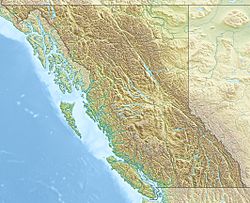Dark Mountain facts for kids
Quick facts for kids Dark Mountain |
|
|---|---|
| Highest point | |
| Elevation | 1,974 m (6,476 ft) |
| Prominence | 389 m (1,276 ft) |
| Listing | List of volcanoes in Canada |
| Geography | |
| Location | British Columbia, Canada |
| Parent range | border of Tanzilla Plateau (Stikine Plateau) & Cassiar Mountains |
| Geology | |
| Mountain type | Subglacial mound |
| Volcanic arc/belt | Northern Cordilleran Volcanic Province |
| Last eruption | Pleistocene |
Dark Mountain is a mountain located in the northern part of British Columbia, Canada. It sits in a region known as the Tanzilla Plateau. This mountain is found northeast of a small community called Dease Lake, close to Cry Lake.
Contents
What is Dark Mountain?
Dark Mountain is a special type of mountain. It is known as a Subglacial mound. This means it was formed by volcanic activity that happened under a thick sheet of ice or a glacier. Imagine a volcano erupting, but instead of lava flowing freely, it's trapped under ice!
Where is Dark Mountain Located?
This mountain is in the Northern Interior of British Columbia. This area is part of a larger region called the Stikine Plateau. Dark Mountain is also near the Cassiar Mountains. It's a remote and beautiful part of Canada.
Why the Name Change?
Before 1937, Dark Mountain was actually called Black Mountain. The Canadian Geological Survey decided to change its name. This was done to avoid confusion. There were many other places with similar names, like other "Black Mountains." Changing the name helped people know exactly which mountain they were talking about.
How Was Dark Mountain Formed?
Dark Mountain is a Subglacial mound. These mounds are created when lava erupts beneath a glacier or ice sheet. The hot lava melts the ice, forming a lake of meltwater. The lava then cools quickly in this water, creating unique shapes. Over time, as the ice melts away, the mound is left behind.
Volcanic Activity in the Past
Dark Mountain is part of the Northern Cordilleran Volcanic Province. This is a large area in western Canada and Alaska with many volcanoes. The last time Dark Mountain was active was during the Pleistocene epoch. This was a long time ago, between 2.6 million and 11,700 years ago.
 | Chris Smalls |
 | Fred Hampton |
 | Ralph Abernathy |


